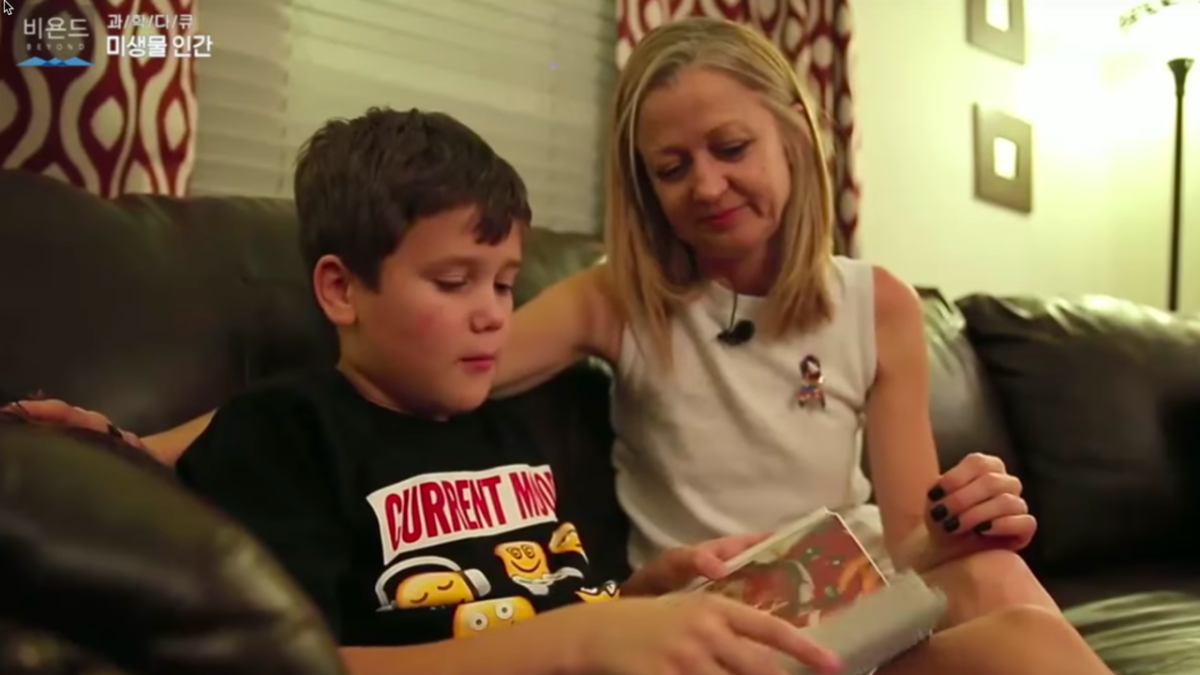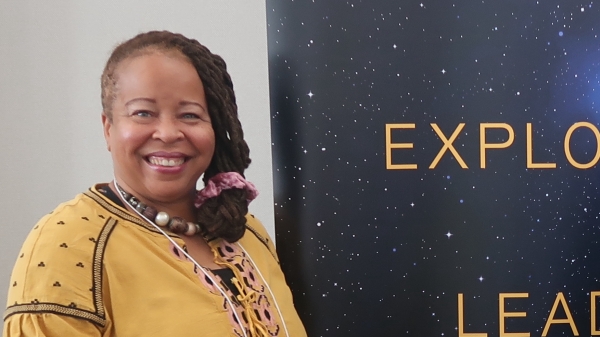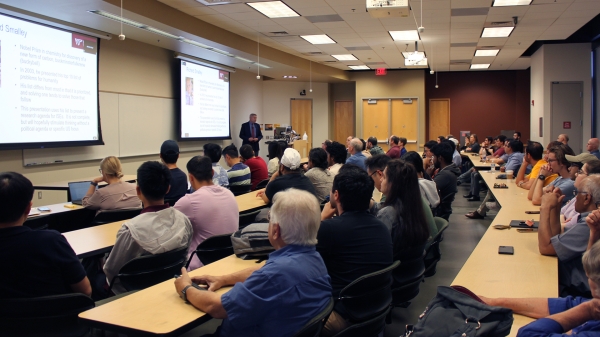TV documentary spotlights ASU researchers’ findings on autism-related gastrointestinal problems

The Korean documentary “Microbiome Human” includes an extensive segment that chronicles the case of a young boy with autism who had struggled with severe diarrhea from infancy. He received microbiota transplant therapy as part of a clinical trial led by ASU researchers. After treatment, the boy experienced a dramatic drop in symptoms of gastrointestinal disorder and a reduction of autism symptoms. Video image from the documentary “Microbiome Human”
A recently broadcast multipart Korean television documentary that explores new treatments for people with autism and gastrointestinal problems includes reports on research led by three Arizona State University faculty members.
James Adams, Rosa Krajmalnik-Brown and Dae-Wook Kang collaborated on the research projects whose results are featured in the documentary.
Together they co-authored the study “Treating gastrointestinal disorders in children with autism using microbiota transplant therapy,” which drew the attention of the producers of the science educational documentary for the Educational Broadcasting System, one of the major television networks in South Korea, similar to the Public Broadcasting System in the United States.
The research journal Microbiome published a paper about the therapy co-authored by Adams, Krajmalnik-Brown and Kang along with several colleagues.
The World Health Organization estimates 1 in 160 children have autism spectrum disorder, which is characterized by some degree of impaired social behavior, communication and language. Symptoms begin in childhood and can persist through adolescence and adulthood.
Strikingly, many children and adults with autism have chronic gastrointestinal problems, and it was this aspect that the ASU team wanted to better understand. Adams found that the severity of these problems correlated with the severity of autism.
A follow-up study led by Krajmalnik-Brown and Kang and published in 2013 revealed that children with autism had about 25 percent fewer species of bacteria in their gut compared to healthy controls.
The lower diversity of gut bacteria is generally associated with worse gut problems. So, the team led a phase-one clinical trial of 18 children with autism, treating them with microbiota transplant therapy.
The therapy involves first using an antibiotic to kill pathogenic bacteria, then a bowel cleanse to remove remaining bacteria and the antibiotic, and then seven to eight weeks of full-spectrum microbiota, using gut bacteria from people without autism spectrum disorder.
By the end of treatment, there was an 80 percent reduction in symptoms of the gastrointestinal disorder and a 25 percent reduction in autism symptoms. The improvements remained when the researchers performed a follow-up exam eight weeks after treatment ended.
The Korean documentary, titled “Microbiome Human,” focuses on the role of the microbiome in the human body, and a segment in Part 1 of the series features a young boy with autism who had experienced severe diarrhea since infancy. After the microbiota transplant therapy, his gastrointestinal problems ceased and his autism symptoms were significantly less prominent, according to both an autism evaluator and the boy’s mother.
Adams is a President’s Professor of materials science and engineering in ASU’s Ira A. Fulton Schools of Engineering, and leader of the Autism/Asperger’s Research Program at ASU. He teaches in the of Materials Science and Engineering program in the Fulton Schools’ School for Engineering of Matter, Transport and Energy.
Krajmalnik-Brown is a Fulton Schools associate professor of environmental engineering who works in the Biodesign Institute’s Swette Center for Environmental Biotechnology and the Center for Fundamental and Applied Microbiomics. She teaches in the Fulton Schools’ School of Sustainable Engineering and the Built Environment.
Kang is an assistant research scientist in both the Swette Center for Environmental Biotechnology and the Center for Fundamental and Applied Microbiomics.
The introduction to the documentary features Krajmalnik-Brown. Part 2 includes interviews with Adams and Krajmalnik-Brown. Part 3 includes a segment with Adams’ adult daughter, Kim, who has autism.
View the complete documentary on YouTube:
The ASU team is starting to recruit for another microbiota treatment study, this one for adults with autism. For more information or to apply, click here.
Joseph Caspermeyer, managing editor for the ASU Biodesign Institute, contributed to this article
More Science and technology

Associate professor shares her journey from NASA to ASU
From leading space missions to designing and building spaceflight hardware and training students in space science and engineering…

Famed systems engineer inspires ASU to tackle global problems
“Providing great talent with great opportunity can make a great difference.” Such was a key part of the message delivered by G.…

The science behind chronic stress
Stress comes in many shapes and sizes. There’s the everyday stress of preparing for a final exam or being stuck in traffic. And…